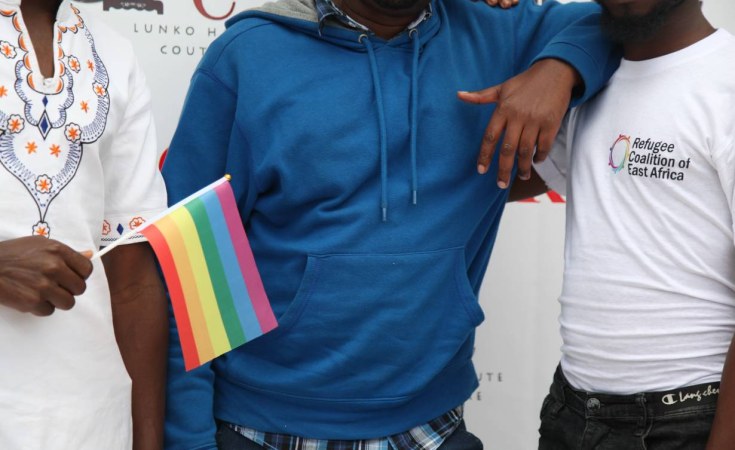Same-sex relationships are legal in only 22 out of 54 African nations. In some countries, laws are being strengthened against people who identify as LGBTQ, which many African leaders consider "contrary to culture norms."
Francis, as he wants to be referred to, is a gay Ugandan who lives in fear following the passage in parliament last month of Uganda's Anti-Homosexuality Bill 2023. It calls for harsh penalties against anyone who engages in gay sex.
LGBTQ activists in Uganda said the bill's passage triggered a wave of arrests, evictions and mob attacks against gay people.
Francis spoke to DW about how he and other gay people in the East African nation fear for their lives.
"We are going through a lot of difficulties," he said. "We've been harassed so much. Our rights are often abused, [we are] physically attacked and socially excluded."
'Draconian' legislation
Francis said he is in a state of shock and misery due to such treatment.
"We feel as if we are not human beings here in Uganda, because the way we are being treated, we really think that maybe we are aliens in Uganda," Francis lamented. "Imagine, just because of our sexuality."
The draconian bill, if signed into law by Ugandan President Yoweri Museveni, would impose the death penalty for "aggravated homosexuality" and 20-year prison terms for "promoting homosexuality."
Museveni last month described gay people as "deviations from normal" and more recently indicated he wanted the legislation strengthened to allow people who voluntarily renounce homosexuality to be "rehabilitated."
"I ask the President of Uganda not to sign the Anti-Homosexuality Bill," Francis pleaded.
How widespread is homophobia across Africa?
Uganda is not the only country where homosexuality is illegal and LGBTQ people face abuse, rejection and persecution.
In fact, nearly half of all countries worldwide where homosexuality is outlawed can be found in Africa, according to a global review by the International Lesbian, Gay, Bisexual, Trans and Intersex Association (ILGA).
Same-sex relations are legal in only 22 of Africa's 54 countries, the report said.
In some of the countries where gay sex isn't allowed -- including Mauritania, Somalia, and Nigerian states that practice Sharia law -- offenders can be punished by death or lengthy prison terms.
People in many of these African countries consider gay people foreign or alien to the continent's culture.
Why does Africa have such a poor reputation for LGBTQ rights?
African sociologist Dr. Nana Obiri Yeboah told DW that people "exhibiting homosexual tendencies" isn't new in African society, however, gay people have been encouraged to be discreet about their sexuality.
Yeboah described homosexuality as "foreign."
"People have practiced it [homosexuality] here a long time, but because it is frowned upon, people have organized against it," he added
Yeboah said the push for the recognition of same-sex rights would continue to face stiff opposition in most African countries.
"It's not part of our norm and has never been acceptable to us. So it's not part of our culture orientation," he explained, adding, "it is not a tradition."
But doesn't culture evolve?
But an African emerita professor of anthropology, Takyiwaa Manuh, told Ghana's state broadcaster that the there is nothing "foreign" about gay people in African society.
"I'm 70 years old," she said. "I grew up hearing about all the gays and lesbians, whether you like the alphabets or not, they've not been imported from anywhere."
Manuh said culture that is dynamic and evolves, so using culture as a defense for preaching hate against people who happen to be gay is unacceptable.
"I'm a lawyer and an anthropologist, culture is not static," the gender activist said. "It is interesting in all the countries where this issue is making the rounds, culture gets resurrected as the shield, the big shield."
For most African countries, anti-LGBTQ laws date as far back as the colonial era. Most of those laws haven't been changed since those countries gained independence.
Dr. Yeboah -- who is against same-sex marriages -- said that weddings in the African context only promote union between two opposite sexes.
"Our definition of marriage is a relationship between two [people of the] opposite sex as being acceptable socially and legally," he said, adding that any push for same sex marriages would lead to harsher anti-LGBTQ laws.
But for Manuh, gay people only want to be free from stigma and discrimination, as well as widespread threats and violence.
"The point is that gays and lesbians haven't asked for anything. This same sex marriage that gets imported, they have not asked for it. They are only asking to be left in peace and then we try to confuse the debate," she said.
Africa's most queer-friendly countries
Despite stiff opposition to LGBTQ rights in Africa, a growing number of countries are legalizing same-sex relationships.
In 2006, South Africa became the first African country to legalize same-sex marriage. Its constitution also protects against discrimination based on sexual orientation.
Mozambique in 2015, dropped a colonial-era clause outlawing same-sex relationships from its penal code.
Botswana's High Court made a similar move in 2019, replacing a law that had dated back to 1965 when the country was under British rule.
Angola in 2021, became the latest African country to decriminalize same-sex relationships, after passing a new law to replace one that dated back to the colonial era.
For Francis, these breakthroughs are just a few success stories -- but not significant on a larger, continental scale. People like him continue to suffer abuses in countries that preach homophobia.
They only option for him, he said, was to flee for safety elsewhere as it remains a tall order to have LGBTQ rights fully accepted in Africa.
Edited by: Keith Walker


